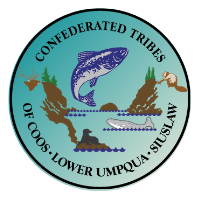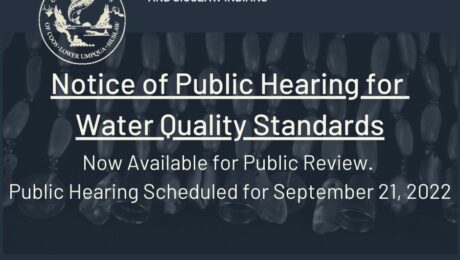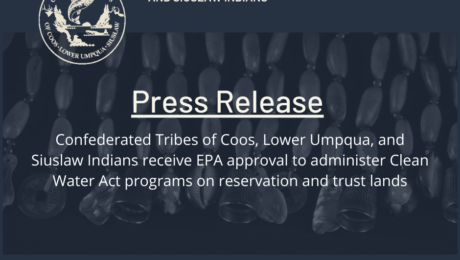Notice of Hearing for Water Quality Standards
Notice of Public Hearing
Regarding Adoption of Water Quality Standards for the Waters of the Tribe
The Confederated Tribes of Coos, Lower Umpqua and Siuslaw Indians (CTCLUSI) invites the public to review and comment on the Tribe’s draft Water Quality Standards (WQS). WQS are science-based criteria describing the conditions necessary to sustain healthy human and aquatic life within the Tribe’s waters. These WQS apply only to waters within the boundaries of the Tribe’s trust and reservation lands and are not applicable to public or privately owned waters of the State of Oregon.
The CTCLUSI Department of Natural Resources (DNR) will hold a public hearing at 6:00 PM Pacific Time on September 21st, 2022, for the purpose of hearing comments and recommendations on the development of Tribal Water Quality Standards.
Topic: CTCLUSI Water Quality Standards Public Hearing
Time: September 21, 2022, 6:00 PM Pacific Time
Click here to Join Zoom Public Hearing
There will be time during the public hearing allocated to commenters who wish to make statements, as well as time for unscheduled comments. Written comments will be accepted until Friday, September 30, 2022. To sign up for a scheduled time to speak at the public hearing, submit written comments, or for questions, please email: WaterQualityStandards@ctclusi.org. Comments will be limited to no more than five minutes and may be less depending upon the number of speakers interested. For more information, visit ctclusi.org.
Once the comment period ends, DNR will review the comments and revise the WQS draft to create a final version. Tribal Members will then have an additional opportunity to comment when Tribal Council considers the final version for adoption into Tribal Code. The CTCLUSI DNR is conducting this hearing and accepting public comments pursuant to Tribal Council Resolution 22-084 (June 12, 2022), which directs DNR to initiate a public comment period and submit the final WQS to the Environmental Protection Agency (EPA) for review.
Section 518 of the Clean Water Act (CWA) allows federally recognized tribes to implement and administer water quality programs within tribal land in the same manner as states, provided that the tribe is first determined to be eligible by the EPA. On May 3, 2021, the EPA determined that CTCLUSI is eligible to administer a water quality certification program under CWA Section 401 and develop water quality standards in accordance with CWA Section 303(c). Furthermore, the Clean Water Act states that it is the EPA’s responsibility to review new or revised water quality standards, per CWA Section 303(c)(3). The federal regulations at 40 C.F.R. Part 25 govern the public participation requirements for CTCLUSI to meet before receiving WQS approval.
The CTCLUSI Water Quality Standards were developed using the best available science and existing EPA-approved state and Tribal water quality standards. The document contains an anti-degradation policy and implementation plan, designated use categories, and narrative and numeric water quality criteria.
The anti-degradation policy and implementation plan can be found in sections 10-1-14 and 10-1-15. Together, they are meant to ensure that Tribal water quality is maintained sufficiently to meet the needs of plants, animals, and humans that utilize the Tribe’s waters.
The designated uses of the waters of the Tribe, as defined in sections 10-1-25 and 10-1-26, describe the types of activities the Tribe’s waters are used for. Multiple designated uses often apply to a single area. For instance, Big Creek, which flows through the Tribe’s Talbot Tract, is designated for both Cultural and Ceremonial use as well as use by Resident Fish and Aquatic Life. The table of designated uses and what Tribal waterbodies they apply to can be found at 10-1-27(a).
Finally, the draft contains narrative and numeric water quality criteria. Narrative criteria uses descriptive language describing the proper conditions of the Tribe’s waters and can be found from 10-1-16 to 10-1-23. For example, the narrative criteria in section 10-1-16(a) covering floating solids, oil, and grease reads: “All waters shall be free from visible oils, scum, foam, grease, and other floating materials and suspended substances of a persistent nature resulting from other than natural causes.”
Numeric criteria uses numbers, measures and values to express water quality standards, and can be found in sections 10-1-28 through 10-1-32. For example, the numeric criteria addressing dissolved oxygen for areas designated as shellfish growing and harvesting says “In fresh water and estuarine water, dissolved oxygen may not be less than 8.0 mg/l as an absolute minimum. Where natural conditions of barometric pressure, altitude, and temperature preclude attainment of the 8.0 mg/l, dissolved oxygen may not be less than 90 percent of saturation.”
- Published in Public Notices, Tribal Event, Tribal News
CTCLUSI Receive EPA approval to administer Clean Water Act programs on reservation and trust lands
Contact: Mark MacIntyre/EPA – Seattle 206-553-7302/ Macintyre.mark@epa.gov
Confederated Tribes of Coos, Lower Umpqua, and Siuslaw Indians receive EPA approval to administer Clean Water Act programs on reservation and trust lands
Seattle (May 3, 2021) The U.S. Environmental Protection Agency has approved the request by the Confederated Tribes of Coos, Lower Umpqua, and Siuslaw Indians to assume responsibilities of the Clean Water Act’s water quality standards and certification programs on reservation and trust lands.
With this approval, the CTCLUSI will assume authority over all surface waters within the Reservation and trust Lands. Trust lands include lands located outside of the reservation that are held in trust by the United States for the CTCLUSI. The CTCLUSI reservation and trust lands collectively cover almost 15,000 acres of southwest Oregon.
According to Dan Opalski, Director of EPA’s Water Division in Seattle:
“We are pleased to approve the Confederated Tribes of Coos, Lower Umpqua, & Siuslaw Indians’ request for Treatment in a Similar Manner as a State. We support their efforts to protect water quality and celebrate this enhancement of our partnership in implementing the Clean Water Act. We look forward to our continued work with the tribes to protect vital resources now and for future generations.”
According to the CTCLUSI tribal Council:
“This Treatment in a Similar Manner as State recognition is an important acknowledgment of tribal sovereignty by the EPA. We are very pleased with this determination. Water is Life! Water is and always has been an important resource for the Confederated Tribes of Coos, Lower Umpqua, & Siuslaw Indians and we are excited that we can now manage the tribe’s waters more directly.”
The CTCLUSI applied to EPA for “Treatment in a Similar Manner to a State” (TAS) for the Clean Water Act section 303(c) water quality standards and the section 401 water quality certification programs on December 17, 2019, and supplemented the application on June 12, 2020.
Specifically, this approval will enable the CTCLUSI to set water quality goals and standards – the regulatory and scientific foundation for protecting water quality – for all water bodies within the CTCLUSI reservation and trust Lands. EPA’s approval does not alter or modify water quality standards outside of the CTCLUSI reservation and trust Lands.
Today’s approval authorizes the CTCLUSI to develop water quality standards for all surface waters within the CTCLUSI reservation and trust Lands and to ensure that CWA-permitted discharges will meet all applicable water quality standards for reservation waters after those standards are reviewed and approved by EPA. The CTCLUSI have previously been granted TAS status for other Clean Water Act sections: section 106 – Water Pollution Protection and section 319 – Nonpoint Source programs, in 2002 and 2003, respectively.
Background
Several federal environmental laws, including the Clean Water Act, authorize EPA to treat eligible federally recognized Indian tribes in a similar manner as a state for implementing and managing certain environmental programs. The basic requirements for applying for TAS are that the tribe must be federally recognized; have a governing body to carry out substantial governmental duties and powers; have the appropriate authority; and be capable of administering the functions of the program.
EPA’s approval of the CTCLUSI’s application does not constitute an approval (nor disapproval) of the tribes’ water quality standards. Any water quality standards adopted by a tribe and submitted to EPA for action must satisfy all Clean Water Act and other regulatory requirements, including public participation to ensure an appropriate opportunity for any interested entities to provide input on the proposed water quality standards.
# # #
Mark A. MacIntyre
Senior Public Information Officer
U.S. EPA Region 10
1200 Sixth Ave. Suite 155 MS – 12-D-12
Seattle, WA 98101
Desk: 206.553.7302
Mobile: 206.369.7999
- Published in Public Notices, Tribal News


